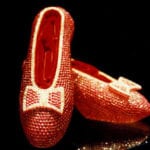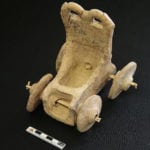 Movies and TV
Movies and TV  Movies and TV
Movies and TV  Our World
Our World 10 Places with Geological Features That Shouldn’t Exist
 Crime
Crime 10 Dark Details of the “Bodies in the Barrels” Murders
 Animals
Animals The Animal Kingdom’s 10 Greatest Dance Moves
 Movies and TV
Movies and TV 10 Box Office Bombs That We Should Have Predicted in 2025
 History
History 10 Extreme Laws That Tried to Engineer Society
 History
History 10 “Modern” Problems with Surprising Historical Analogs
 Health
Health 10 Everyday Activities That Secretly Alter Consciousness
 History
History Top 10 Historical Disasters Caused by Someone Calling in Sick
 Animals
Animals 10 New Shark Secrets That Recently Dropped
 Movies and TV
Movies and TV 10 Weird Ways That TV Shows Were Censored
 Our World
Our World 10 Places with Geological Features That Shouldn’t Exist
 Crime
Crime 10 Dark Details of the “Bodies in the Barrels” Murders
Who's Behind Listverse?

Jamie Frater
Head Editor
Jamie founded Listverse due to an insatiable desire to share fascinating, obscure, and bizarre facts. He has been a guest speaker on numerous national radio and television stations and is a five time published author.
More About Us Animals
Animals The Animal Kingdom’s 10 Greatest Dance Moves
 Movies and TV
Movies and TV 10 Box Office Bombs That We Should Have Predicted in 2025
 History
History 10 Extreme Laws That Tried to Engineer Society
 History
History 10 “Modern” Problems with Surprising Historical Analogs
 Health
Health 10 Everyday Activities That Secretly Alter Consciousness
 History
History Top 10 Historical Disasters Caused by Someone Calling in Sick
 Animals
Animals 10 New Shark Secrets That Recently Dropped
Top 10 Oldest Known Versions Of Everyday Things
Humans have been mucking about inventing things for thousands of years, and many of the items we take for granted today were actually invented long ago. That includes shoes, musical instruments, money, and plenty more.
Looking back over the millennia, it’s interesting to see when things pop up in the archaeological record. Odds are, many of these items you’re familiar with were created much further back in history than you previously thought.
10 The Oldest Known Coin
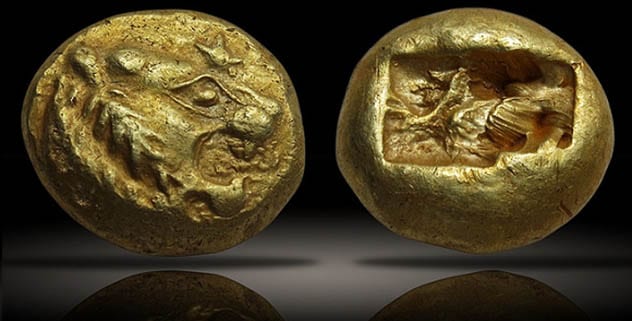
The oldest coin known to exist is the Lydian stater, which is comprised of a mix of gold and silver called electrum. The coin was minted around 600 BC in the kingdom of Lydia in what is now modern Turkey.
The coin was discovered in Ephesus, an ancient Hellenic city that operated as a prosperous trading center on the coast of Asia Minor in what is now the Turkish city of Selçuk. Electrum is a naturally-occurring alloy that was used to hand strike the coin. The front features a lion’s head while the reverse has the punch mark where the hammer struck the blank piece of metal.[1]
While the Lydian sater is the oldest known coin, it doesn’t come from the oldest monetary system. The first recorded use of money can be traced to the Mesopotamian civilization, which used a shekel, first recorded in 3000 BC. Instead of a coin, a shekel was first a weight measurement. However, it would eventually evolve into silver weights and coins over time.
Before the advent of the shekel, various cultures used commodity money, which is an object that has been ascribed a value for use in trade. Ancient cultures often used various shells, including cowry shells, in places like India.[2]
9 The Oldest Shoe Ever Found
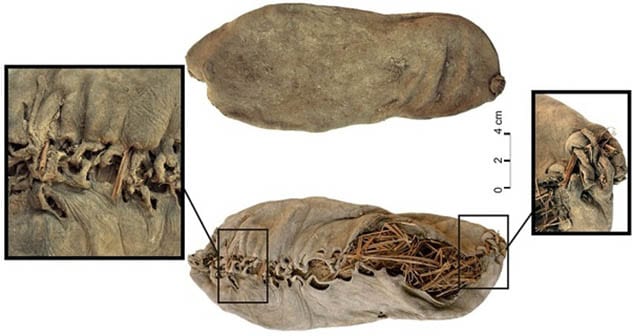
Humans have been protecting their feet for thousands of years, but very little that was used by early humans to do so has survived to the present day. Still, there are records of people wearing footwear, and the oldest shoes ever found were located in a cave in the Vayoys Dzor province of Armenia. The so-called “Areni-1 shoe” is a 5,500-year-old leather shoe first discovered in 2008, and it is in considerably good condition.
Unfortunately, the shoe’s mate wasn’t found, but the discovered one is in excellent condition, considering its age. The shoe was located under a thick layer of sheep dung, which worked with the cave’s cool, dry conditions to preserve it. Along with the shoe, containers were found with preserved wheat, apricots, and barley.
Grass was found inside the shoe, which may have been used as a form of insulation, though it may have been used to maintain the shoe’s shape while it wasn’t worn.
The Areni-1 shoe is a one-piece leather shoe with laces, which is believed to have been a common type of footwear worn at the time. It is similar to the Opanci, a traditional Balkan shoe still worn today.[3]
8 The Oldest Known Recipe For A Drink (Yes, It’s Beer)
Historians and archaeologists are aware that beer was first invented as far back as 10,000 BC in ancient Mesopotamia after finding remnants on pottery from that time. Beer arose around the same time as cereal agriculture became widespread, though no recipes from that period have been found.
The oldest recorded mention of beer comes from the epic of Gilgamesh,[4] which dates as far back as sometime between 3500 and 2500 BC. The Sumerians were known to have concocted eight recipes for beer made from barley, and an equal amount brewed from wheat.
A recipe for beer has been found from 1800 BC in the Hymn to Ninkasi, the ancient Sumerian tutelary goddess of beer (and alcohol). It is believed that the hymn was sung while the beer was being brewed, and it was then taught from master brewers to their apprentices.[5]
While modern beer is brewed with greater technological ease, the recipes haven’t changed much since they were first written down. Today, beer is consumed primarily as a recreational drink, but in ancient times, it was used as a source of calories, hydration, and religious festivals and celebrations, so… not much has changed.
7 The Oldest Recipe For Food

While a recipe for beer has been found from some 3,800 years ago, it’s not the oldest known recipe to exist. That honor goes to a recipe for nettle pudding, dating back much further to around 6,000 BC.
What’s fascinating about the recipe is that all the necessary ingredients are still commonly available, so anyone can make the world’s oldest dish. The recipe was uncovered by a research team working for the University of Wales Institute in Cardiff through an analysis of archaeological evidence, medieval records, and social history texts.[6]
Here’s all you will need to recreate the recipe:
one bunch of sorrel
one bunch of watercress
one bunch of dandelion leaves
two bunches of young nettle leaves
one bunch of chives
one cup of barley flour
one teaspoon of salt
While you may not have a lot of that in your cupboard, odds are, you can find some of it growing outside.
The pudding is made by combining the ingredients in the proper order before securing them in linen or muslin cloth with a long string. Once it’s boiled for at least two hours, usually with a joint of boar or venison, it can be removed from the cloth, cut into slices, and eaten with barley bread.[7]
6 Oldest Musical Instrument
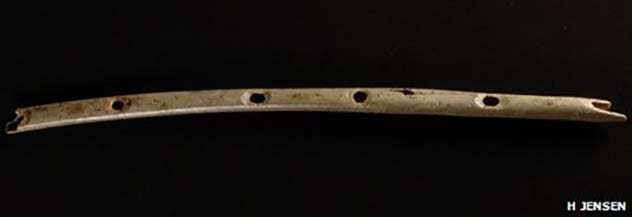
Music has long been an aspect of every human culture on Earth, but it’s likely most people aren’t aware of how long people have been enjoying it. As far as we are able to tell, people have been creating music for at least 42,000 years.
We know this because of a find in a cave in Germany that was once occupied by a group of modern humans. Multiple flutes were found in the cave, one of which was made from a bird bone while the other was created using mammoth ivory.
The flutes were found in Geissenkloesterle Cave in Germany’s Swabian Jura, which was previously theorized to be a part of “a key corridor for the movement of humans and technological innovations into central Europe between 40,000 [and] 45,000 years ago.”[8]
The previous record for the oldest musical instrument was found by the same researchers in the Hohle Fels cavern in southern Germany. Professor Nick Conard of the Tuebingen University found a 35,000-year-old flute measuring 7.8 in (20 cm), and was carved from a vulture’s wing bone.[9]
10 Of The Oldest Artifacts In The World
5 The Oldest Prosthetic Device
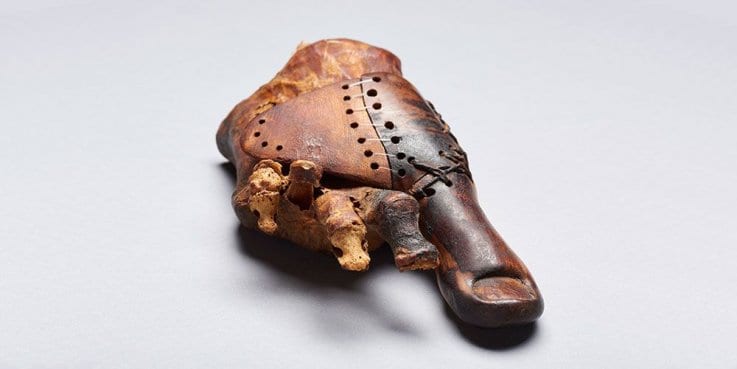
Humans have been losing limbs since the beginning of the species. Over time, various methods were created to mitigate a missing appendage. Pirates had their peglegs, and that sort of thing, but the use of prosthetic devices meant to mimic a lost appendage are much older.
The oldest prosthetic device ever found was unearthed in a tomb near the city of Luxor in 1997, and has been on display in the Cairo museum ever since its discovery. The item in question is a prosthetic toe made of wood and leather.
An analysis of the artifact determined that it belonged to a woman, and it showed considerable signs of use. It had been refitted multiple times to shape it to the woman’s foot, which likely made it more comfortable for long-term use.
Given the technical expertise that clearly went into crafting the prosthetic toe, it’s likely others in Egypt used them. Unfortunately, no others have been found that date to around 1000 BC, as this one does. The manner in which it was made and maintained likely resulted in a freedom of movement that approximated what it would have been like before losing the toe it replaced.[10]
4 The Oldest (Reusable) Condom
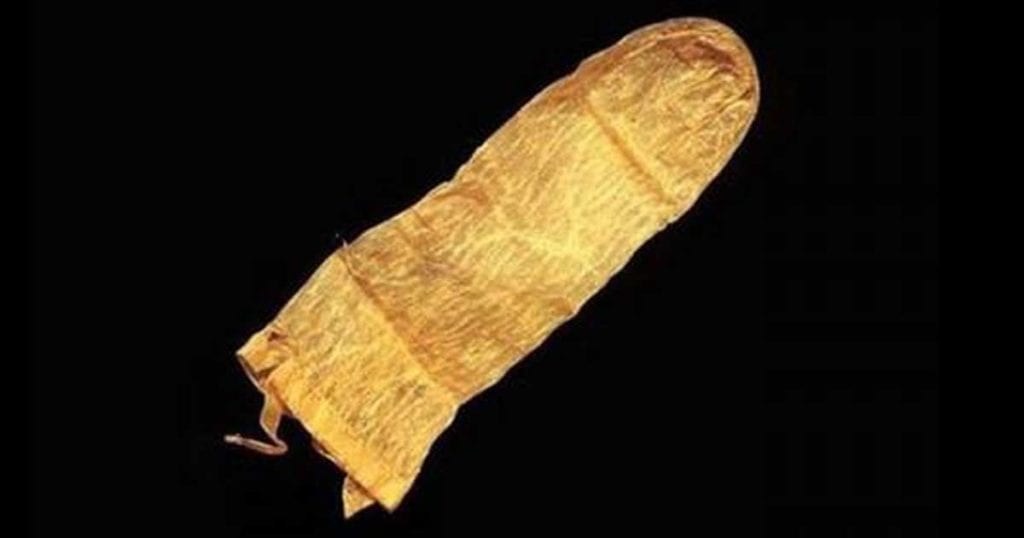
Because modern birth control in the form of condoms are made of rubber latex via a complex suite of machines, most people probably believe they are a relatively new invention. As it happens, condoms have been around for much longer than most people realize, and the oldest known one to exist was made in 1640.
The ancient birth control device was found in Lund, Sweden, and is made from a pig intestine. That may sound strange, but lambskin was a common material used prior to the creation of latex, and it’s still used in condom production for those with a latex allergy.
The condom wasn’t the only thing found related to 17th-century interests in avoiding pregnancy. In addition to the reusable condom, there was an owner’s manual written in Latin. The manual recommended washing the condom in warm milk to ensure it prevented disease.
This indicated that the condom’s manufacturer was well aware of its product’s inability to stop disease. While this was the oldest condom ever found, condoms of various types have been in use since around 11,000 BC, according to cave paintings in France.[11][12]
3 The Oldest Recorded Tune
While it’s clear that music has been a factor in human culture for at least 42,000 years, records of the music played on the instruments that have been found are largely nonexistent. Still, there are some records of music that have made it to modern times, and the oldest is 4,000-years-old.
The oldest known piece of music is only a fragment of a musical notation found on a 4,000-year-old Sumerian clay tablet. The tune is a hymn honoring the ruler Lipit Ishtar, but it is, unfortunately, incomplete.
The oldest complete piece of music known to exist is the “Hurrian Hymn No. 6,” which is an ode to the goddess Nikkal. It was composed in cuneiform by the Hurrians sometime in the 14th century BC.
The hymn is complete, and it even came with musical notations, making it possible to play on a lyre. The lyrics that originally accompanied the music remain partly concealed. Still, it has been pieced together and translated from what is available, so you can listen to a song written some 3,400 years ago.[13]
2 Oldest Map Ever Found
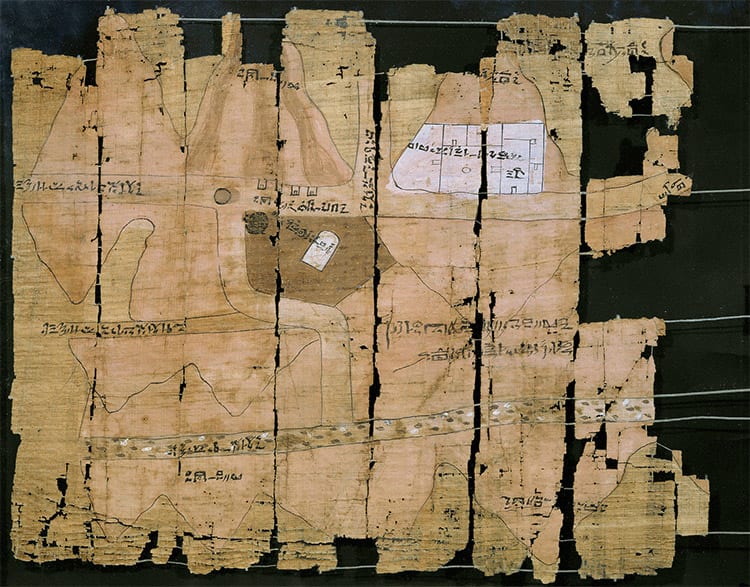
Most people with a cellphone use maps all the time, even if they don’t think of their GPS guide to a particular destination as a map. Still, that’s what it is, though it’s a highly evolved map, considering how they looked originally.
Maps have been around far longer than many of the items on this list, though there aren’t as many surviving examples as archaeologists and historians would like. The oldest known map of the world is the Imago Mundi, a Babylonian Map of the World, dating to between 500 and 700 BC.
The map is a carving that depicts Babylon in the center. Assyria and Elam are also shown, surrounded by a “Salt Sea,” forming a ring around the cities. The map features cuneiform text describing the local mythology in the region.
The oldest known geographic map ever found is the Turin Papyrus Map. Amennakhte, a well-known scribe in ancient Egypt, drew the map around 1150 BC. It depicts an area designated for a quarry expedition and was ordered by King Ramses IV.[14]
The oldest surviving terrestrial globe is called the Erdapfel and was produced by Martin Behaim in 1492. It doesn’t depict the Americas and includes some exaggerated land masses as well as some mythical ones.[15]
1 The Oldest Phallus Known To Exist
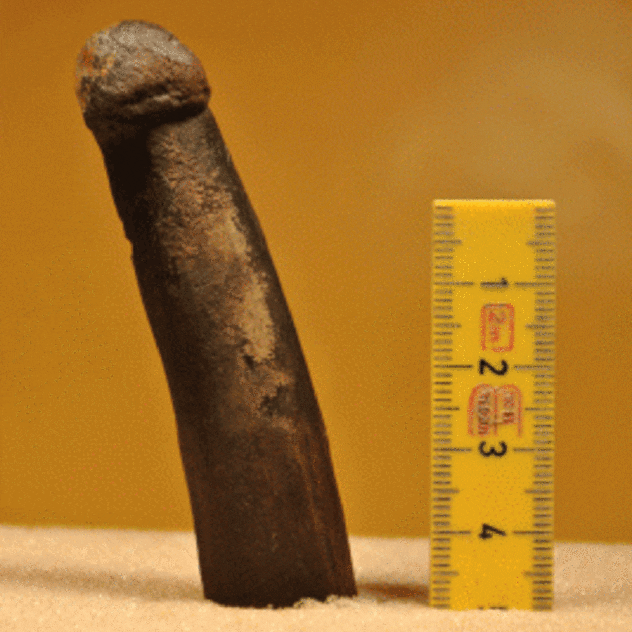
While it isn’t unreasonable to think that condoms were a modern invention, the artificial phallus, which is a nice way of saying “dildo,” has been around far longer. The oldest known dildo that has ever been found is a stone phallus dating back some 30,000 years.
The archaeologists who discovered it dubbed it an “Ice-Age baton,” and while it’s the oldest, it’s hardly the only one ever found. A far more intact one was found at Hohle Fels Cave in Germany. That one is fully intact and was made from fine-grained siltstone, which was ground, polished, and incised.
While it served an obvious purpose, it is also believed that it may have been used as a hammerstone. Over the years, other phallus’ have been found, including one dating to sometime between 4,000 and 6,000 BC.
That particular phallus was carved from a stag antler, and measures 4.1 in (10.5 cm) in length and is 0.78 in (2 cm) in diameter. According to Dr. Martin Rundkvist, a Swedish archaeologist who wrote of his find, “There are many non-dildoish uses for which it may have been intended but without doubt, anyone at the time would have seen the penile similarities.”[16][17]
10 Of The Oldest Surviving Silent Horror Movies
